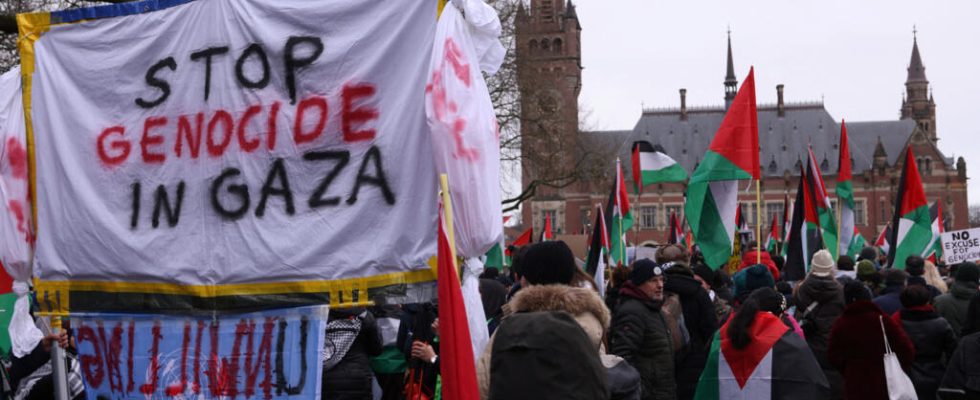At the end of December, South Africa seized the International Court of Justice (ICJ), accusing Israel of violating the Convention on the Suppression and Prevention of Genocide. Before ruling on the merits, the UN Court must render its decision this Friday on the emergency measures requested by Pretoria.
4 mins
The International Court of Justice (ICJ) could potentially order Israel to stop its military campaign in Gaza. The highest court of the UN announced on Wednesday that it would issue its decision on urgent measures this Friday claimed by South Africawho accuses Israel of ” genocide » Palestinians in the Gaza Strip.
The reading of this decision will begin at 1 p.m., in the large courtroom of the Peace Palace, in The Hague, in the Netherlands. The 17 judges will not rule on the facts: whether or not Israel is committing genocide against the Palestinians in Gaza. This question will be decided at another stage of the case.
The judges will have to assess whether the risks denounced by the South Africans are plausible, and if this is the case, order Israel to take certain measures, reports our correspondent in The Hague, Stephanie Maupas. An ICJ ruling against Israel would certainly increase political pressure on the country and could serve as a pretext for sanctions.
On Thursday January 25, Hamas undertook to respect a ceasefire if it was requested on Friday by the ICJ, on the condition that Israel also complies with it. “ If the ICJ decides on a ceasefire, the Hamas movement will respect it as long as the enemy does the same », Assured the Palestinian Islamist movement in a press release.
Read alsoIsrael accused of “genocidal acts”: “We have been waiting a long time for a state to take the initiative”
Order the suspension of Israeli military operations
During the pleadings delivered before the Court On January 11 and 12, South Africa’s lawyers asked the judges to order the suspension of Israeli military operations. Pretoria also demanded an end to transfers forced population, their access to humanitarian aid, food, water, medical assistance. Finally, Pretoria had requested that any speech inciting “ genocide » of the Palestinians and that the commissions of inquiry can enter the Gaza Strip.
South Africa nevertheless recognized the “ particular weight of responsibility » to accuse Israel of genocide. But South Africa’s lawyers had argued that Israel’s bombing campaign was aimed at “ the destruction of Palestinian lives » and had pushed the people “ on the verge of starvation “.
If the Palestinians are hoping for a decision from the ICJ that would increase pressure on Israel, on the Israeli side, a conviction could have a counterproductive effect, believes Denis Charbit, associate professor of political science at the Open University of Israel.
By pillorying Israel and making Israel a pariah state, do not believe for a single second that Israeli opinion will say that the situation is very serious and that we must comply with the decision of the ICJ. In terms of the Israeli reaction, it will be another blow to this feeling of loneliness in Israel, which is the major obstacle for Israelis to accept the idea of an Israeli-Palestinian peace process. If we want the Israelis to participate in a peace process, we must tell them that they are legitimate, and that what they did in Gaza may be a war crime, but certainly not a genocide.
Denis Charbit, associate professor of political science at the Open University of Israel
“ No one will stop us, neither The Hague nor the axis of evil »
The judges are not bound by the South African demands, but if they decide to take measures, Israel will have the obligation to comply, otherwise it risks appearing as a failed state. According to Israeli Army Radio, Benyamin Netanyahu would have called a meeting on Thursday to decide on potential follow-ups, but the Israeli Prime Minister has already suggested that he would not feel obliged to follow an order from the ICJ. Shortly after the mid-January hearings, he declared: “ No one will stop us, neither The Hague nor the axis of evil. »
The ICJ ruling is seen as an important test of international justice and will be closely scrutinized around the world, with many countries already siding with one of the two sides. Four other countries – Bangladesh, Bolivia, Comoros and Djibouti – had signed the referral filed by South Africa last November, which called for an investigation into the “ situation in the State of Palestine “.
For its part, the United States has already rejected South Africa’s request, and Germany has said it will intervene as a third party alongside Israel when the court considers the genocide case on the bottom.
(And with AFP)
